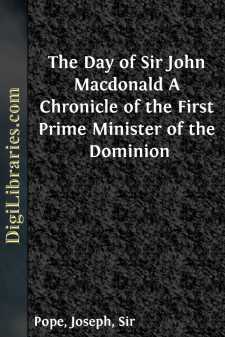Categories
- Antiques & Collectibles 13
- Architecture 36
- Art 48
- Bibles 22
- Biography & Autobiography 813
- Body, Mind & Spirit 142
- Business & Economics 28
- Children's Books 14
- Children's Fiction 11
- Computers 4
- Cooking 94
- Crafts & Hobbies 4
- Drama 346
- Education 46
- Family & Relationships 57
- Fiction 11829
- Games 19
- Gardening 17
- Health & Fitness 34
- History 1377
- House & Home 1
- Humor 147
- Juvenile Fiction 1873
- Juvenile Nonfiction 202
- Language Arts & Disciplines 88
- Law 16
- Literary Collections 686
- Literary Criticism 179
- Mathematics 13
- Medical 41
- Music 40
- Nature 179
- Non-Classifiable 1768
- Performing Arts 7
- Periodicals 1453
- Philosophy 64
- Photography 2
- Poetry 896
- Political Science 203
- Psychology 42
- Reference 154
- Religion 513
- Science 126
- Self-Help 84
- Social Science 81
- Sports & Recreation 34
- Study Aids 3
- Technology & Engineering 59
- Transportation 23
- Travel 463
- True Crime 29
The Day of Sir John Macdonald A Chronicle of the First Prime Minister of the Dominion
by: Joseph Pope
Categories:
Description:
Excerpt
YOUTH
John Alexander Macdonald, second son of Hugh Macdonald and Helen Shaw, was born in Glasgow on January 11, 1815. His father, originally from Sutherlandshire, removed in early life to Glasgow, where he formed a partnership with one M'Phail, and embarked in business as a cotton manufacturer. Subsequently he engaged in the manufacture of bandanas, and the style of the firm became 'H. Macdonald and Co.' The venture did not prove successful, and Macdonald resolved to try his fortunes in the New World. Accordingly, in the year 1820, he embarked for Canada in the good ship Earl of Buckinghamshire, and after a voyage long and irksome even for those days, landed at Quebec and journeyed overland to Kingston, then and for some years after the most considerable town in Upper Canada, boasting a population (exclusive of the military) of about 2500 souls.
At that time the whole population of what is now the province of Ontario did not exceed 120,000, clustered, for the most part, in settlements along the Bay of Quinté, Lake Ontario proper, and the vicinity of the Niagara and Detroit rivers. The interior of the province was covered with the primeval forest, which disappeared slowly, and only by dint of painful and unceasing toil. The early accounts of Kingston bear eloquent testimony to its primitive character. In 1815, according to a correspondent of the Kingston Gazette, the town possessed no footways worthy of the name, in consequence of which lack it was, during rainy weather, 'scarcely possible to move about without being in mud to the ankles.' No provision existed for lighting the streets 'in the dark of the moon'; a fire-engine was badly needed, and also the enforcement of a regulation prohibiting the piling of wood in public thoroughfares.
Communication with the outside world, in those early days, was slow, toilsome, and sometimes dangerous. The roads were, for the most part, Indian paths, somewhat improved in places, but utterly unsuited, particularly in spring and autumn, for the passage of heavily laden vehicles. In 1817 a weekly stage began running from Kingston to York (Toronto), with a fare of eighteen dollars. The opening of an overland highway between Kingston and Montreal, which could be travelled on by horses, was hailed as a great boon. Prior to this the journey to Montreal had been generally made by water, in an enlarged and improved type of bateau known as a Durham boat, which had a speed of two to three miles an hour. The cost to the passenger was one cent and a half a mile, including board.
In the early twenties of the nineteenth century the infant province of Upper Canada found itself slowly recovering from the effects of the War of 1812-14. Major-General Sir Peregrine Maitland, the lieutenant-governor, together with the Executive and Legislative Councils, was largely under the influence of the 'Family Compact' of those days. The oligarchical and selfish rule of this coterie gave rise to much dissatisfaction among the people, whose discontent, assiduously fanned by agitators like Robert Gourlay, culminated in open rebellion in the succeeding decade....


